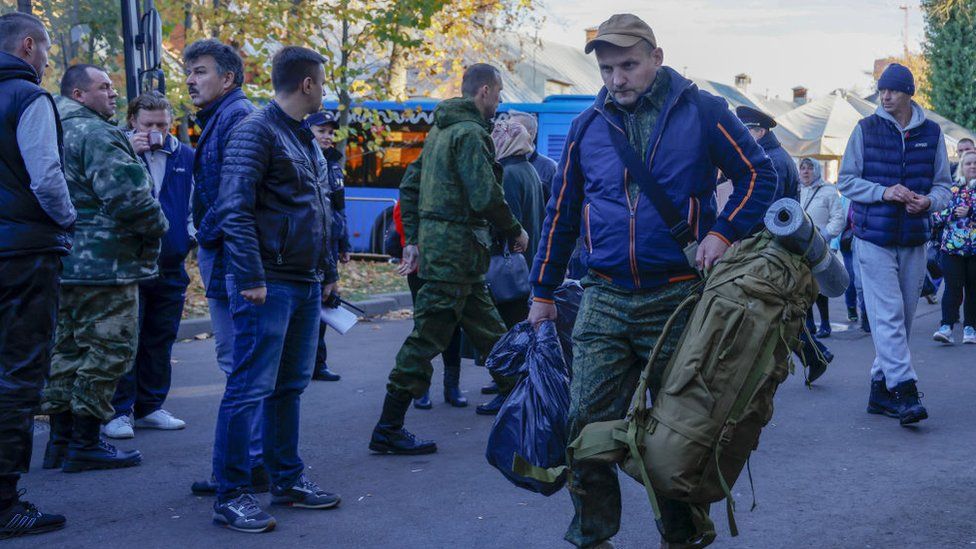Ukraine war: Migrants in Russia forced to fight in Putin's war
- Published

Russia's Wagner mercenary group has reportedly recruited tens of thousands of prisoners to fight in Ukraine. But the growing number of casualties and extrajudicial executions make it much harder to find volunteers, even in prisons.
Many convicts are now worried that they can be simply forced to go to war - and migrant workers from Central Asian countries find themselves particularly vulnerable.
Anuar came to Russia in search of work in 2018. He was later imprisoned for drug trafficking and sent to serve his term at Penal Colony Number Six in Vladimir region. The BBC is not disclosing his real name and citizenship for safety reasons.
At the end of January, he told his father that a group of Central Asians had been sent to fight in Ukraine without their consent. "There are lots of Uzbeks, Tajiks, Kyrgyz there in that prison. Now they are planning to send another group and my son is worried that they will force him to go too," Anuar's father told the BBC.
The BBC has seen court documents and Anuar's letters which confirm he is indeed serving his sentence in that prison. And his story about the group that was forced to go to Ukraine in January is also corroborated by Olga Romanova, director of the civil rights organisation Russia Behind Bars. Parents of those prisoners approached her for help.
"They were not given a choice. They were told to sign the contract and were sent to the front line like a bag of potatoes," Ms Romanova said.
Initially, the parents were willing to go to court so that their children wouldn't end up in Ukraine, she says. But then they refused to, out of fear of the punishment their children could face if they stayed in prison.
Penal Colony Number Six is notorious for its ill-treatment and frequent beatings of convicts. Olga Romanova described it as "a torture prison". It's where Alexei Navalny, the prominent Russian opposition figure, is being held.
The colony's administration has not replied to the BBC's request to respond to the allegations that they forced prisoners to sign military contracts.
Recruitment in prisons appears to have been very successful, but things are changing as the Wagner group is suffering heavy losses on the battlefield.
BBC Uzbek has spoken to Farukh (not his real name), a citizen of Uzbekistan who is in prison in Russia's Rostov region. Several of his fellow inmates joined Wagner. First it was voluntary, Farukh said, but now he's worried that prisoners may be forced to go to war.
"In the beginning, I also considered going because everyone thought that Russia was more powerful, that Russia would win - maybe in one month, three months or in one year. But now we see how many people are dying there and if they are short of soldiers - it's not good. If they tell me to go and I refuse, then they can declare that I am against Russia."
Central Asian citizens are recruited to fight for Russia in other ways too, not just in prisons. Overall, there are about 10.5 million migrants from Uzbekistan, Tajikistan and Kyrgyzstan working in Russia, according to the latest statistics from the Russian Interior Ministry. And that's a massive resource for military headhunters to tap.
Russian authorities openly sign up people to join the armed forces at the migration centre in Moscow. There are even ads in Uzbek, Kyrgyz and Tajik languages offering citizens of these countries a fast track to obtain a Russian passport if they join the armed forces.
But activists say that it's not always voluntary.
Migrant rights defender Valentina Chupik told the BBC that police officers sometimes stopped Central Asian migrants on the street and intimidated them into signing a military contract. They were told that otherwise they would get deported, Ms Chupik said.
Many labour migrants lack proper work permits, live at a place other than where they're registered, or violate other migration rules. And that's why they can be an easy target for recruiters.
Aziz, not his real name, who has dual Russian and Tajik citizenship, told the BBC he was detained during a police raid at the construction site where he works. He was told he'd be taken to a police station to check his ID but instead, he ended up at a military enlistment office. When he started shouting at police officers demanding why they had lied to him, they twisted his arms and threw him back into the bus.
Eventually they released him.
But many migrants in Russia are too afraid of law enforcement officers to object to being signed up for the war.
- Published8 February 2023
- Published2 February 2023
- Published27 December 2022